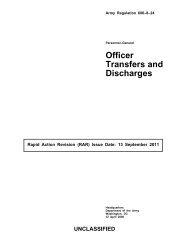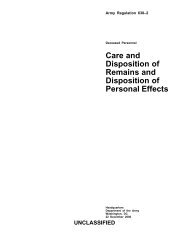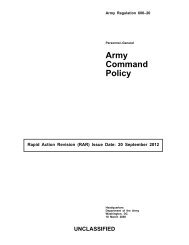Patient Administration - Army Publishing Directorate - U.S. Army
Patient Administration - Army Publishing Directorate - U.S. Army
Patient Administration - Army Publishing Directorate - U.S. Army
You also want an ePaper? Increase the reach of your titles
YUMPU automatically turns print PDFs into web optimized ePapers that Google loves.
a. Treatment during and after duty. RC members on AD or full-time NG duty or IDT are authorized medical and<br />
dental care in <strong>Army</strong> MTFs for injury, illness, or disease incurred or aggravated in the LD while performing that duty or<br />
while traveling directly to or from the duty.<br />
(1) While on AD or full-time NG duty orders for more than 30 days, RC personnel are authorized health care on the<br />
same basis as the active component.<br />
(2) After expiration of the period of duty, RC personnel are authorized medical and dental care only for conditions<br />
incurred or aggravated in LD while on that training/duty or while traveling directly to or from such training/duty. (AR<br />
135-200 addresses administrative procedures to be carried out at the time of expiration of the training or duty.)<br />
(3) While on IDT, AD, or full-time NG duty for 30 days or less, RC personnel are authorized medical and dental<br />
care as a result of injury, illness, or disease incurred or aggravated incident to IDT or ADT (AR 135-381).<br />
(4) Health care authorized for persons in (3) above will be provided until the resulting disability from covered<br />
disease or injury cannot be materially improved by further hospitalization or treatment.<br />
(5) While not on duty and while voluntarily participating in aerial flights in Government-owned aircraft under<br />
proper authority and incident to training, RC members are authorized medical and dental care required as the result of<br />
an injury incurred in LD.<br />
b. Status after period of duty. Upon expiration of the AD or full-time NG duty orders or the IDT period, RC<br />
members are released from duty. While receiving treatment after expiration of the IDT or duty specified in orders,<br />
members are in a patient status but not on AD. Provisions of AR 135-381 may apply.<br />
c. Training under other conditions. Upon presentation of official authorization (see d(2) below), individuals in (1)<br />
and (2) below may be hospitalized in or transferred to an <strong>Army</strong> MTF to appear before a medical evaluation board<br />
(MEB) and a physical evaluation board (PEB), if indicated, as provided in AR 635-40.<br />
(1) Individuals undergoing hospitalization in other Federal MTFs or civilian hospitals.<br />
(2) Individuals not in a hospital status where it appears that they are disqualified for further military service as a<br />
result of a condition incurred or aggravated in LD.<br />
d. Authorization for care of personnel on duty for 30 days or less, those on IDT, and Reserve Enlistment Program of<br />
1963 (REP 63) personnel.<br />
(1) When the initial treatment is accomplished during a period of authorized duty and medical care is continued<br />
after expiration of the duty period, written authorization from the RC unit is not required, but written consent from the<br />
patient is required. Personnel on duty for 30 days or less are not enrolled in TRICARE Prime.<br />
(2) In all other cases, the individual will be required to present an official authorization for treatment as follows.<br />
(a) Authorization issued by the respective State Adjutant General or his or her designee, in the case of a member of<br />
the <strong>Army</strong> or Air Force NG who suffered injury or contracted disease while performing training duty in his or her NG<br />
status.<br />
(b) Authorization issued to members of the RC by the unit commander. For individuals who were in training status<br />
but not assigned to a unit, the U.S. <strong>Army</strong> Reserve Personnel Center (ARPERCEN) will issue authorization. The<br />
provisions of this paragraph also apply in the case of REP 63 personnel of the NG.<br />
(c) Authorization from the Bureau of Medicine (BUMED) and Surgery, Department of the Navy, for members of<br />
the Naval Reserve and Marine Corps Reserve.<br />
(d) Authorization from the individual’s unit commander for Air Force Reserve personnel.<br />
(3) Prior written request from the person’s unit commander is required for treatment of <strong>Army</strong> and Air Force RC<br />
personnel injured while on IDT and for admission of members of the Naval Reserve, Marine Corps Reserve, and<br />
USCG Reserve who suffer injury or contract disease while on IDT.<br />
(4) If medical care is furnished in an emergency without the required authorization, the MTF commander will<br />
request authorization from the appropriate authority indicated in (2) above. Letters of authorization will include the<br />
name, social security number (SSN), grade, and organization of the patient; the type and period of duty in which<br />
engaged; and the diagnosis (if known). The letter will also state that the injury suffered or disease contracted was in<br />
LD and that the patient is entitled to medical care.<br />
e. LD determinations. When individuals are admitted to or treated at an MTF during a period of training duty under<br />
doubtful LD conditions, the MTF commander will ensure that an LD is initiated. The MTF commander will be<br />
furnished a copy of the final determination (to include a report of investigation, when made). In injury cases where LD<br />
may be questionable, LD investigation should be requested promptly. Non-emergent surgical intervention will be<br />
deferred for suspected preexisting conditions of RC personnel until there is an LD determination that the condition was<br />
incurred or aggravated in LD.<br />
(1) If the investigation results in a not in line of duty (NLD) determination before the date of expiration of the<br />
training period, every effort will be made to disposition hospitalized individuals by the expiration date or as soon as<br />
they become transportable. Care for NLD conditions will be provided only to the extent necessary. Such persons are<br />
not authorized medical care at Government expense after expiration of their training period. The cost of any care<br />
furnished after the expiration date will be collected at the civilian emergency rate from the individual by the MTF<br />
concerned. (See app B and chap 10.)<br />
AR 40–400 27 January 2010<br />
9
















